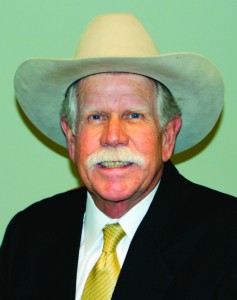
By Jay Evans
Chair of the TSCRA Natural Resources and Environment Committee
Ranching in South and West Texas will naturally expose a person to drought. I have always tried to understand how precious water is across the state, but the recent drought of record has raised awareness to levels many of us have never experienced. We have been blessed with more rain since 2011, but we aren’t back where we need to be. When we look at the level of our reservoirs and stock ponds west of IH 35, a person realizes we have a long way to go. Additionally, people are moving into Texas at a more rapid pace. While we are extremely proud of our state and realize how great it is to live here, this population growth will continue to create increased demands on our limited water supply. As expected, water issues are coming to the forefront as the 84th session of the Texas Legislature progresses. Texas and Southwestern Cattle Raisers Association (TSCRA) leaders and staff have been tracking and weighing in on water related legislation to make sure landowners’ private property rights remain intact. TSCRA is opposed to a bill that could require local groundwater conservation districts to give special treatment to power plants that have permitted groundwater wells. Under this proposed bill, power plants could be allowed to continue to pump groundwater at their permitted amount while other permitted wells, such as irrigation, would be required to make reductions. In fact, these other permitted wells may have to take larger reductions to absorb the amount of reduction the power plants did not take. A power plant could be granted up to 10 years to pump at their existing permit amount while every other permitted well would be required to reduce pumping. This puts local groundwater conservation districts in a difficult position of having to pick winners and losers and it increases their liability. The power plants that would benefit from the passage of this legislation have the right to a fair share like any other groundwater owner. However, if their fair share is not adequate, they have the same right as any other groundwater owner to purchase and/or lease more land and/or groundwater rights. While TSCRA recognizes that providing reliable electric service is important, we do not believe that it is constitutional for state law to discriminate between permitted groundwater well owners based on type of use. After all, is generating electricity more important than providing food? This bill implies that it is and sends the wrong message. All groundwater well owners should be treated equally and be afforded the same due process. TSCRA is also concerned about legislation that would create a separate permitting system for brackish groundwater, which is water that is generally not potable. With the population growth in Texas, entities are looking to increase efforts to tap into these brackish groundwater resources and use desalination technology to help meet our increasing water needs. While TSCRA supports the development of brackish groundwater, we do not support legislation that would further complicate our current groundwater permitting system, give special treatment to brackish groundwater wells, and put additional pressure on the property rights of landowners. Brackish groundwater has been, and can continue to be, developed under existing law. Additionally, we must develop reliable science with input of landowners and groundwater conservation districts, which will help us all better understand our brackish groundwater resources. TSCRA supports additional state funding for the development of this science. As we look at the big picture of providing water for all Texans, we must make certain local control is preserved. The legislature decided years ago that local groundwater conservation districts are the preferred method for managing groundwater in the state and we must keep this in mind when working on these important groundwater issues. TSCRA will continue working with the Texas Legislature to protect the private property rights of landowners, especially groundwater. I encourage you to keep a close watch on these and other issues and contact TSCRA if you have ideas, questions or concerns. In the meantime continue to pray for rain, especially since we know you can’t legislate rainfall.
Jay Evans serves as president of Jay Evans Company, a ranch and resource management organization that provides services to ranchers and landowners in Texas as well as operating his own stocker program. Jay serves as chair of the TSCRA Natural Resources and Environment Committee and is a member of the TSCRA board of directors.





We need a statewide regulatory body for groundwater similar to the Railroad Commission of Texas for oil and gas. Native Americans understood that a central planning body was requisite.